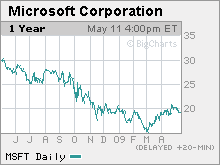Microsoft sells $3.75 billion in first debt issue
Cash-rich software giant announced its debt authorization in September allowing it to sell up to $6 billion in bonds.
NEW YORK (Reuters) -- Microsoft Corp. Monday sold a $3.75 billion debt issue in its first foray into the U.S. corporate bond market, joining a spate of companies taking advantage of beneficial borrowing conditions.
The cash-rich, "triple-A" rated Microsoft announced its first debt authorization last September, allowing it to issue up to $6 billion in debt. Monday's bond sale attracted well over $10 billion in demand, market sources said.
The sale included $2 billion of five-year notes yielding about 95 basis points over comparable U.S. Treasurys, $1 billion of 10-year notes yielding about 105 basis points over Treasurys and $750 million of 30-year bonds yielding about 105 basis points over Treasurys, according to IFR, a Thomson Reuters service.
Microsoft (MSFT, Fortune 500), the world's largest software maker, has already issued about a third of its $6 billion debt authorization in the commercial paper market.
It says it does not need financing, but will use the proceeds for general corporate purposes, including working capital and buying back stock, according to a spokesman.
The company decided to take advantage of "good market conditions and Microsoft's great credit rating," a spokesman said. The software giant is one of only a handful of U.S. companies still rated 'AAA' by both Moody's Investor Service and Standard & Poor's.
Fitch rates it one notch lower at 'AA-plus'.
"I think people thought it might be the only shot in a lifetime to lend money to Microsoft," said Robert Bishop, portfolio manager at SCM Advisors in San Francisco. "When a company is borrowing and they don't really need the money, you don't know when you're going to get another shot at them."
As of the end of March, Microsoft reportedly had cash and short-term investments worth $25.3 billion.
The sale did well because "Microsoft is a great credit and everybody's got a place in their portfolio for a few high quality credits," Bishop added. Still, he declined to participate because yields being offered "didn't seem like great value."
The bond sale benefited from massive investor cash flowing into corporate bonds as tentative signs of economic recovery improve investors' appetite for risk.
"An awful lot of people want to pile into the credit markets now," Bishop said. "They think things are better but the problem is, I think they probably don't realize how much spreads have tightened over the course of the last two months."
Corporate bonds started attracting demand when their yield spreads hit a record 656 basis points over Treasurys last December. As the market rallied, spreads have narrowed to just 444 basis points, according to Merrill Lynch data.
But companies are taking advantage of the falling yield spreads, with more than $26 billion of U.S. corporate bonds sold in just the first six business days of the month, according to Thomson Reuters data.
"It seems to me that there's almost an urgent need for issuers to announce a deal as quickly as they can to catch the market before it does turn the other way," said Richard Lee, head of fixed income at New York broker-dealer Wall Street Access.
The corporate bond market appeared to already be softening on Monday, with spreads suffering their first widening in weeks under the spate of heavy supply.
Microsoft's shares ended down 10 cents at $19.32 on Nasdaq.
Its bond sale was led by JPMorgan (JPM, Fortune 500) and Morgan Stanley (MS, Fortune 500), with Banc of America Securities and Citigroup (C, Fortune 500) as passive managers.
The debt sale had sparked talk that Microsoft could be readying a bid for German business management software firm SAP, in light of a recent article in Barron's citing an analyst as saying SAP cannot remain independent forever.
SAP Co-Chief Executive Leo Apotheker, in New York unveiling an acquisition, declined to comment on a possible Microsoft bid but did say he believes his firm should stay independent.
SAP's stock rose 2.85% in Germany. ![]()


